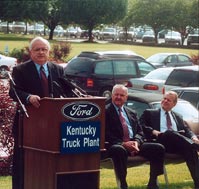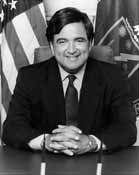Capitol
Line
Senate
Maintains CAFE Moratorium
Project
Impact Phase III Funding Approved
DOE
Freeze on Free-Release of Radiated Scrap
 Summer Successes
Summer Successes
The AISI public policy shop had
a busy Summer 2000, with several policy issues in play that could have
negative impacts on the demand for North American steel. AISI and its
member companies proved to be up to the challenge, registering several
victories that will protect traditional steel markets, while laying the
groundwork for future market development lobbying efforts.
Senate Maintains
CAFE Moratorium
Despite intense lobbying from environmental groups, the steel
industry and its allies succeeded in maintaining a moratorium on
increasing Corporate Average Fuel Economy (CAFE) standards. Approved as
part of the FY 2001 House Transportation Appropriations bill (H.R. 4475),
the moratorium effectively prohibits the Department of Transportation from
increasing CAFE standards for light trucks.
AISI argued successfully that the steel industry has used the moratorium to develop new light-weight applications for high-strength steel in cars and trucks through the Ultralight Steel Autobody (ULSAB) and Advanced Vehicle Concept (AVC) programs, which are now finding their way into new model designs. AISI, working with a coalition of groups organized by the Alliance of Automobile Manufacturers (AAM), convinced lawmakers that the moratorium would give automakers the additional time needed to move these new technologies into the marketplace in a timely fashion to increase fuel economy, without arbitrary and potentially disruptive government mandated timetables and standards.
As expected, Sen. Slade Gorton (R-WA) proposed a resolution on the Senate floor to instruct the Senate conferees on the Transportation Appropriations bill to delete the House moratorium language. Recognizing the votes were not there to pass his resolution, Sen. Gorton ultimately revised his proposal to support the House moratorium language, on the condition that Congress authorize a study of the CAFE issue by the National Academy of Sciences (NAS). The NAS study is due back to Congress by July 1, 2001, and will look at a range of CAFE-related issues, including the impact of increasing CAFE standards on the auto and related industries (i.e., steel). Sen. Gorton’s resolution, passed by a voice vote on the Senate floor, also requires any proposed increases in CAFE standards to be approved by a Joint Resolution of Congress before taking effect.
Project IMPACT Phase III Funding
Approved
 |
| U.S. Army Project IMPACT signing ceremony: AISI Vice Chairman, and Chairman, President and CEO of LTV Corporation Peter Kelly spoke at Ford's Kentucky Truck Plant in Louisville. Seated are Frank Foley, Ford KY Truck plant manager and Bob Hines, engineering director, Truck Vehicle Center. |
Working with Sen. Mitch McConnell (R-KY) and Rep. John Murtha (D-PA), AISI and the Ford Motor Company, obtained $5 million in FY 2001 Defense Department appropriations for Phase III of Project IMPACT (Improved Materials and Powertrain Architecture for 21st Century Trucks). The project is designed to transfer technological advances developed by the steel and auto industries, including research conducted under AISI’s ULSAB and Light Truck Structures projects, to the next generation of light weight tactical military vehicles. Project IMPACT is important to the steel industry to ensure that the next generation of military vehicles and related commercial truck designs will be made of high performance steel.
To commemorate the award of the U.S. Army Project IMPACT contract to Ford, AISI representatives, including AISI Vice Chairman Peter Kelly of the LTV Corporation, participated in a signing ceremony at Ford’s Kentucky Truck Plant in Louisville, KY. Sen. McConnell spoke at the event, which also included high-ranking U.S. Army and Ford Motor company officials and the President of the University of Louisville, a major research partner on the project.
DOE Issues Freeze on Free-Release of Radiated Scrap
 |
| DOE Secretary Bill Richardson |
After months of working the issue on the legislative and administrative fronts, AISI, as part of the Metals Industry Recycling Coalition (MIRC), scored another public policy victory in mid-July, when Department of Energy (DOE) Secretary Bill Richardson issued a moratorium on the free-release of radioactively contaminated scrap from DOE nuclear weapons facilities. In a memorandum issued to Department Heads, Richardson suspended, "…the unrestricted release for recycling of scrap metals from radiation areas within DOE facilities," until DOE can improve its release criteria and information management systems.
The memo called for revising DOE directives and guidelines relative to the release of contaminated scrap and conducting a public comment period and review process. Sec. Richardson’s memo directs all DOE programs and sites to reuse and recycle materials within the Department’s facilities. At the encouragement of MIRC, Richardson directed the Assistant Secretary of Energy Efficiency and Renewable Energy to complete a feasibility study on the potential use of a dedicated mill to recycle contaminated steel for reuse within the DOE complex.
The memo also called for renewed efforts to accelerate the DOE’s program to recover commercial radioactive sources over which the Department has authority.